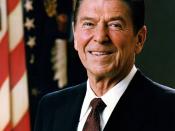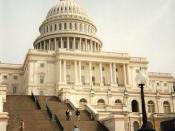The decline of party strength and influence began in the 19th century, partly due to the growth of the federal government under FDR whose 'New Deal' establishment served to undermine traditional social functions once carried out by party machines, thus weakening party loyalty. In the 1960's and 1970s new issues such as civil rights, feminism, environmentalism and consumer rights arose to challenge traditional voting habits. These issues did not divide neatly along party lines and more voters indulged in "ticket-splitting" (voting for different parties in different elections). Partly in response to these trends, the parties themselves began to question their own policies and challenge their leaders.
In Congress, reforms democratized or 'opened up' selection procedures to broader participation. Senior members found themselves surrendering committee chairmanships to unknown newcomers. Whips found it harder to enforce party discipline and junior members increasingly pursued their own personal projects to gain media attention and impress their constituency voters.
Congress members have much to gain, in publicity and in tangible rewards (grants for their constituencies) from unpredictable behavior.
The effect upon presidential influence in Congress has been destructive. President Carter struggled to pass bills through a House and Senate controlled by his own party. President Reagan's early successes were largely due to Democrat 'Boll Weevil' defections. President Clinton has likewise been unable to rely upon solid party support, particularly for his anti-crime legislation and Healthcare Reform bill. Congress has been split by the new individualism of its members.
The rise of the primary in presidential selection was another method used to 'open up' the political system and weaken party influence. Primaries allow voters a direct say in the choice of the party's standard bearer in the presidential election. However, they enable candidates to hijack the party nomination for president by assembling teams of...


